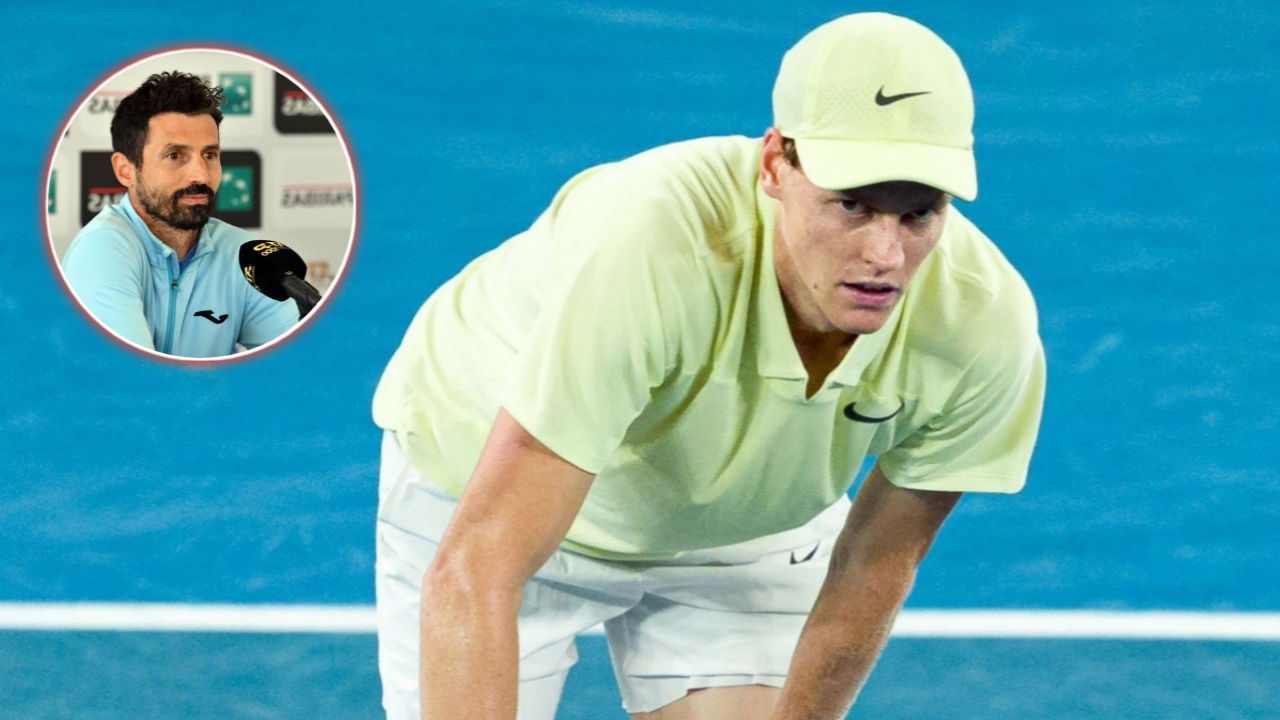Coach Simone Vagnozzi Shocked After ‘Joke’ Statements About Jannik Sinner’s 3-Month Doping Ban
Jannik Sinner will be playing his first tournament since the Australian Open in the ongoing Italian Open which he skipped last year.

Simone Vagnozzi, Jannik Sinner (Image via FITP, X/The Tennis Letter)
Did the three-month ban help Jannik Sinner in some ways? Some thought it helped him recharge his batteries and clear out his head, but his coach Simone Vagnozzi rubbished such claims.
Sinner’s ban was lifted on May 4 and he is gearing up to make his return at the Italian Open which he skipped last year due to an injury. The first seed will be meeting the winner of the first-round match between Mariano Navone and Federico Cina.
Sinner was handed the ban by the World Anti-Doping Agency (WADA) a few days after the Australian Open. Coach Vagnozzi, who joined Sinner’s team in 2022 and guided him to three Grand Slam titles and to the No.1 position on the rankings table along with Darren Cahill, said the three-month suspension was not at all an advantageous situation for the tennis ace.
I was surprised to read some statements, even from insiders, about the possibility that the three-month disqualification could ultimately be an advantage for Jannik…let’s not joke. If that were the case, why did no one ever think of stopping for all that time? We tried to manage the situation as best we could.
Simone Vagnozzi told Italian media
The WADA at first wanted to hand him a ban of between one and two years because of the ignorance of his team members and had appealed to the Court of Arbitration for Sport (CAS) for the same. But a few months before the scheduled CAS hearing, they reached a case resolution with the 23-year-old.
Sinner was contaminated by the banned anabolic steroid clostebol in March last year during physiotherapy sessions. His former physio Giacomo Naldi had a cut on his finger and to heal it, he used a contaminated spray bought from Italy by Sinner’s former fitness coach Umberto Ferrara.
Dan Evans calls Jannik Sinner’s suspension convenient
When Jannik Sinner tested positive for clostebol in March, the International Tennis Integrity Agency (ITIA) waited till August to make the announcement of his failed drug test. Because the ITIA didn’t hand him a lengthy ban, their no-fault or negligence verdict was considered a double standard.

Critics argued that Sinner being a high-profile player was the reason behind him avoiding a ban. Then WADA intervened and demanded that he should be banned.
But because they resolved the case and gave him a ‘lenient’ punishment, the anti-doping agencies once again were accused of giving preferential treatment to the Italian. Former British No.1 Dan Evans said the three-month suspension was convenient for Sinner because he didn’t miss any Grand Slam tournament.
The whole thing is pretty convenient is what I think a lot of the players are thinking. The comeback in Rome, at home, massive for Italian tennis. It seems pretty convenient. This is not Jannik’s problem, this is a tennis problem. From the outside, from the public, they are looking in and thinking he has had preferential treatment.
Dan Evans told BBC 5 Live Sport
Sinner, who lifted eight official titles last year, continued his winning ways in the 2025 season by defending the Australian Open. It was his first event of the season and because his ban was lifted on May 4, he won’t be missing the French Open, which starts on May 25.
Sinner hasn’t yet reached the final at Roland Garros, producing his best in the tournament when he reached the semifinals last year. He lost a thrilling five-set semifinal to Carlos Alcaraz. He could set up another clash with the four-time Grand Slam champion if both of them reach the final.
Also read: Victoria Azarenka Demands More Integrity from Anti-Doping Authorities Amid the Case of Jannik Sinner







